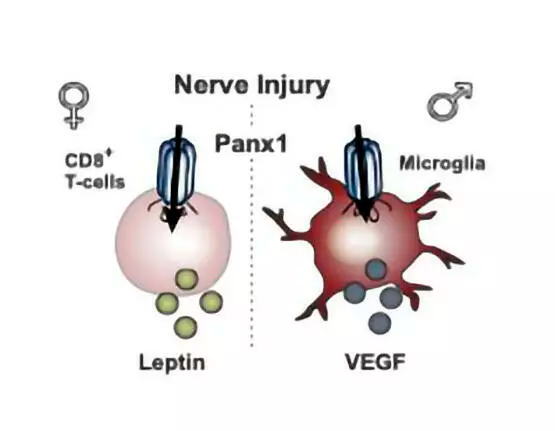A new study led by University of Calgary professor Dr. Tuan Trang, PhD, may help to explain why there is an over-representation of women experiencing chronic pain compared to men. In 2019, the Canadian Pain Task Force report found chronic pain is more common among females of all ages, including children, when compared to males.

Tuan Trang led a study that provides new insight on why women may be experiencing more chronic pain than men. Photo Credit: Riley Brandt, University of Calgary
"Both males and females develop pain, but each sex develops it through different means," says Trang, a professor in the Faculty of Veterinary Medicine, and Cumming School of Medicine (CSM). "This study identifies a very unique type of biological process through a specific immune cell that is distinctive to each sex."
The study, published in Neuron, focused on neuropathic pain, which is caused by injury to a nerve or the nervous system. A debilitating symptom of this is allodynia which is experienced when someone feels pain from a stimulus that does not typically cause pain. This condition can be very hard to treat; for instance, things like a light touch, temperature changes, and clothing against the skin can be agonizing. The study, conducted in rats and mice, found that in both sexes pain signals can be communicated by pannexin 1 (Panx1) channels but through different types of immune cells. In female rodents, however, activation of Panx1 releases leptin, a hormone which has been associated with heightened pain sensitivity.
Chronic pain treatment and the female factor

In female rodents, researchers found injury to a nerve releases leptin, a hormone which is associated with heightened pain sensitivity. Photo Credit: Fan et al., Neuron 2025
"Injury to a nerve can be debilitating," says Trang. "We know that a lot of preclinical research has been in male subjects. Consequently, treatments were often developed from a male-based understanding and may not be very effective in females."
Heightened levels of leptin in females experiencing chronic pain have been recorded in studies before. Trang notes that as far back as the 1980s, researchers who were working with human blood samples found that female patients experiencing chronic pain had higher levels of leptin in their blood than those who did not have chronic pain.
"In the clinic, we've known for many years that women are more likely than men to suffer from chronic pain, and it's often hard to know why some people respond to treatment and others don't," says Dr. Lori Montgomery, MD 03, pain clinician and clinical associate professor at the CSM. "Both sex and gender are important factors that need a lot more investigation, but this latest research might prove to be one of the ways that we can personalize treatment for patients so that it's more likely to be effective."
High-risk a path to high impact
Trang's research is in a category of scientific exploration sometimes referred to as high-risk, high-reward. It means the research has the potential for a big impact, but it also means it could fail. Sourcing funding for this kind of fundamental science can also be difficult. Fortunately, a few years ago, Trang met Calgary philanthropists Donna and Rod Evans. The former business owners have a family member living with chronic pain and were fascinated by the work Trang was leading.
"We had our own company; we are very familiar with high-risk ventures," says Rod. "After talking to Tuan, and hearing about the research he was conducting we wanted to support him."
"I did a lot of my own research. We were impressed with the projects underway at the Hotchkiss Brain Institute," adds Donna. "We told them we were okay with higher-risk opportunities and committed eyes wide open. We're very excited about Tuan's results."
In addition to supporting Trang's research, the Evans have also supported dementia research at Hotchkiss Brain Institute (HBI). Both Rod and Donna's fathers were diagnosed with dementia, so that research is near and dear to their hearts.
The first authors of this paper are Churmy Y. Fan, PhD, '20, Brendan B. McAllister BA '11, MSc '14, PhD '19, and Sierra Stokes-Heck, MSc, '23.
In addition to the philanthropic support of the Evans, Trang received grants from the Canadian Institutes of Health Research (CIHR) and Natural Sciences and Engineering Research Council of Canada. Fan was supported by a Spinal Cord, Nerve Injury, and Pain (SCNIP) award through the Hotchkiss Brain Institute (HBI), McAllister was supported HBI postdoctoral and CIHR fellowships. Additional acknowledgements can be found in the paper.
Tuan Trang is an associate dean and professor in the Faculty of Veterinary Medicine, and a professor in the Department of Physiology & Pharmacology at the Cumming School of Medicine (CSM). He is a member of Hotchkiss Brain Institute and Alberta Children's Hospital Research Institute at the CSM.
Lori Montgomery sees patients in the Calgary Pain Program and is a clinical associate professor in the departments of Family Medicine and Anesthesiology, Perioperative and Pain Medicine at the Cumming School of Medicine (CSM). She is a member of the Hotchkiss Brain Institute and the O'Brien Institute for Public Health at the CSM, and is Community Integration Medical Lead for Alberta Health Services Community, Rural and Continuing Care.













